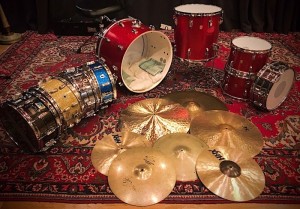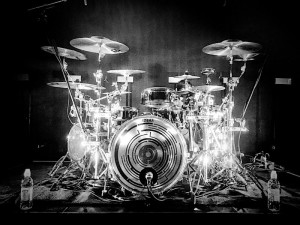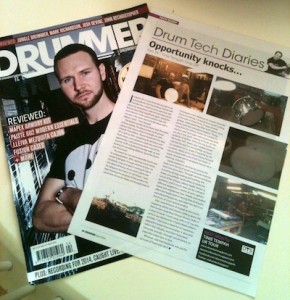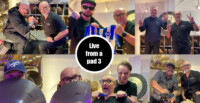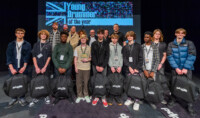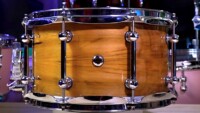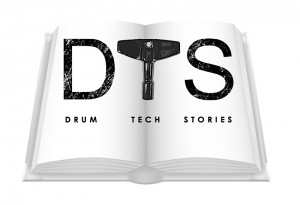 This month were very pleased to start a new series, written by Martin Oldham. Many of you will know him already for his Drum Teching and writing, but for those that don’t, we thought we’d ask him a few questions so you know where he’s coming from when his articles start next month.
This month were very pleased to start a new series, written by Martin Oldham. Many of you will know him already for his Drum Teching and writing, but for those that don’t, we thought we’d ask him a few questions so you know where he’s coming from when his articles start next month.
Who are you?
Hello, and Happy New Year! My name is Martin Oldham and I am a professional Drum Technician. I run a business called DrumTechSupport that has been growing since its launch in 2011.
How would you describe what you do?
Drum Tech-wise, it involves looking after all facets of the drum and percussion equipment that is used by the artist you are working with at the time. This includes the setup and maintenance of the kit, building a close relationship with the player and being polite and personable with those you work with.
Business-wise, I own and self manage my company DrumTechSupport that I set up the moment I started in the industry as a freelancer. The business has developed many avenues over the years; live teching, studio teching, vintage drum hire, restoration, and endorsement assistance.
Drum tech provision to artists has also become primary focus over the last 18 months. There is now a strong stable of drum techs working under the umbrella of DTS on numerous projects.
How long have you been doing it?
I have been a ‘professional’ tech since 2008 when I took over the role of Head Of Drums at John Henry’s in London. John Henry’s, was, and I still believe remains to be the largest backline rental company in Europe. The position allowed me to hone my skills and develop my knowledge very quickly.
Were you a drummer to begin with?
Yes – aren’t we all! I’ve been drumming since I was 17 when I went to see Oasis in Manchester. To cut a long story short, the guy in front of me in the crowd was hit on the head by Alan White’s drumstick when it was thrown from the stage at the end of the gig. I picked up the stick and went to my local drum shop the next day and asked for a pair of the same sticks …
I started playing on pillows and things at home. I had a couple of drum lessons, gave up, and then restarted again by teaching myself to play. From there I was in a few bands around Manchester, then a band in Cheltenham, before joining a band in London called The Others, which had a fair amount of commercial success; Top 40 singles and albums, radio and TV work, press coverage etc. It took me halfway around the world a couple of times and we won the NME award for innovation. It was a great time, but I’ve been there and done it now. I get as much fun and enjoyment from teching as I do/did from playing.
How did you get into it in the first place?
After leaving the band I had some time off, wondering what to do. I took other jobs outside of the industry to keep busy but I was still ‘in’ the scene. I enjoyed working with vintage drums, collecting, fixing and restoring for my own collection. I still had a lot of passion for drums and wanted to be back in the industry but not as a player. I noticed an advert for a position at John Henry’s and the rest is history.
At what point did you think ‘I really enjoy this, this is what I want to do’?
I’ve always known I’ve enjoyed drum teching, even as a player I was hugely into gear, Rhythm and Drummer Magazines were a constant in my life. Working at JH reaffirmed my passion for this side of the industry, it allowed me to develop as a tech, grow, learn and experience things that I would have paid money to do! I began to understand the differences between makes, models etc. I visited countless venues, TV and radio studios, live events etc. My time at JH solidified my ambition to make a career as a drum tech and to launch DrumTechSupport at the same time. The tipping point for me came when I became as busy with external projects while trying to also complete my tasks at JH. I took the risk and decided to go freelance.
Tell us about some of the high points…
There are many! Travel, the ability to be your own boss, meeting people, making friends all over the world, life experiences you wouldn’t ordinarily be afforded, achieving some dreams, ticking off the bucket list etc. The job can be very rewarding.
And what about some of the not so good points…
There are many! But the biggest must be missing family, home, life events etc. To be a success at this (as with most other professions) there is a large amount of personal sacrifice which takes place. When I started the business, I was largely a free individual. However in the years DTS has been running I have got married, had a child, bought a house and taken on all the responsibilities that accompany these things.
What do you think on some of your own personal strengths which help keep you employed?
As DrumTechSupport has grown, I have found my organizational and time management skills being used to there fullest. I have received positive feedback about my calmness, people skills and man-management abilities from my peers. It is assumed that when you are hired for the job that you can do the job, but I also take pride in keeping on top of new products, techniques and research so that I can provide the best service possible.
What are the things that you think every drummer gets wrong?
Are you trying to put me out of business?! I wouldn’t say that there are things that drummers get wrong, but what I would say is that each individual drummer has their own traits, and as a drum tech its my job to learn and understand these to help them feel comfortable to perform. As a drum tech you are there for the drummer as a person as well as the job of maintaining the equipment.
Without having a favorite, who is the one person you’ve worked with who you really enjoyed and why?
Again, as in the previous answer I think its about the individuality that the drummers possess which provide your enjoyment. When I work with certain drummers it is challenging in a positive way – I learn something about the drummer, the gig and myself each day. Other drummers, I have worked with and known for many years so the relationship is more relaxed. There are also ‘dep’ gigs where I only get to work with the drummer for a very short space of time, 1 or 2 days.
What is the one piece of gear you cannot do without?
That’s a deceptively easy question. The obvious and truthful answer is – a drum key (a Tama TDK10 to be precise). However there are a few other ‘crucial’ pieces of equipment that make life as drum tech easier.
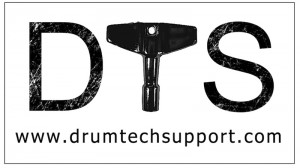 All you need is a Ludwig 400. True or false?
All you need is a Ludwig 400. True or false?
True. And a Drum Key!
Martin Oldham
January 2018
Email – martin@drumtechsupport.com
Website – www.drumtechsupport.com
Facebook – www.facebook.com/drumtechsupport
Instagram – www.instagram.com/drumtechsupport
Twitter – @drumtechsupport

